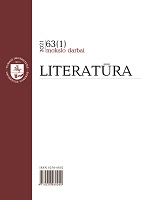Lietuvių literatūra istorinės tiesos paieškose: trys nepriklausomybės dešimtmečiai
Lithuanian Literature in Search of Historical Truth: Three Decades of Independence
Author(s): Audinga Peluritytė-TikuišienėSubject(s): Poetry, Lithuanian Literature, Politics and society, Sociology of Culture, Sociology of Art
Published by: Vilniaus Universiteto Leidykla
Keywords: Singing; revolution; truth; poetry; prose; essay;
Summary/Abstract: The article focuses on the beginning of the Singing Revolution in Lithuanian culture and tries to identify the most significant dominant features in order to understand the entirety of the new changes in literature. In the face of political upheaval, such a dominant feature was the question of truth; however, the well-established poetry tradition – romantic, neo-romantic, modern neo-romantic, which coexisted with social realism in Soviet times, and experimental – did not raise such questions of truth but only reflected the nation’s collective expectations. The evolution of Lithuanian literature, which was highly fragmented during all the decades of the Soviet occupation, united the country through the expatriate poet Bernardas Brazdžionis while he was visiting Lithuania in the summer of 1989. Poetic texts predominated during the first demonstrations of Sąjūdis (the Reform Movement), but while trying to understand their position in the general Lithuanian culture and literature discourse, one needs to acknowledge the leading nature of poetry throughout the Soviet times: having its niche in the cultural system, poetry posed a large number of vexed questions, sought philosophical profundity, and was able to constantly address the deepest metaphysical questions even in strict censorship conditions. Lithuanian prose, which evaded the requirement by the doctrine of social realism to portray the world and characters engaged in class struggles, also found support in the poetry system and created a non-linear but coherent narrative where metaphors prevail. Lithuanian prose poetry became a sign of esthetic quality in independent Lithuania too, where the question of truth, which was important for achieving independence, found a way similar to that of poetry – through memoirs and essays to esthetics and little prose. At the beginning of independence, poetry, which had fed Lithuanian prose with its ideas, themes, conception of the world and esthetic solutions, also merged with memoirs and essays, thus being part of the discourse of telling the truth.
Journal: Literatūra
- Issue Year: 63/2021
- Issue No: 1
- Page Range: 8-28
- Page Count: 21
- Language: Lithuanian

